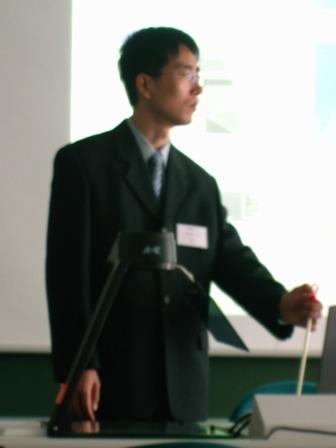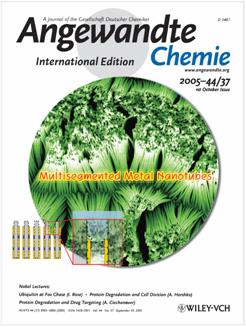|
|
NOVEL TEMPLATE-BASED ELECTROCHEMICAL METHODS FOR MULTI-SEGMENTED NANOTUBE MATERIALS
Woo Lee, Roland Scholz, Kornelius Nielsch, Ulrich Gösele
Max Planck Institute of Microstructure Physics
Weinberg 2, D-06120 Halle (Germany)
Fax: +49 (0) 345 5511223, E-mail: woolee@mpi-halle.de
|

|
Development of the state-of-art electrochemical deposition techniques could provide vast opportunities for
exploring various multi-functional nanostructures, which are potential applications in advanced electronic or
magnetic devices, sensors, and biological separation/transport in nanometer scale. Recently we have developed a
simple electrochemical method for the fabrication of metal nanotubes embedded in nanoporous alumina membranes
with hierarchically organized arrays of cylindrical nanochannels. The method is based on the preferential
electrodeposition of a metal along the pore walls of oxide membrane in the presence of metallic nanoparticles
on the nanochannel surfaces. Ag nanoparticles were successfully immobilized on the surface of alumina nanochannels,
by utilizing the well-established redox chemistry between Ag(I) and Sn(II) ions, where surface bound Sn(II) ions
spontaneously reduce Ag(I) into Ag(0) (i.e., 2Ag(I)(aq) + Sn(II)surface ® 2Ag(0)surface + Sn(IV)surface). By
taking advantage of precise control of the growth of the metal nanotubes, we were able to prepare for the first
time novel multi-segmented metallic nanotubes with bimetallic stacking configurations along the nanotube axes by
employing sequential electrodeposition. In this presentation, fabrication of perfectly ordered metal nanotube
membranes will also be presented together with their applications for the developments of various functional
nanostructures.
Financial support from the German Federal Ministry for Education and Research (BMBF, Project No. 03N8701) is
greatly acknowledged.

|
|